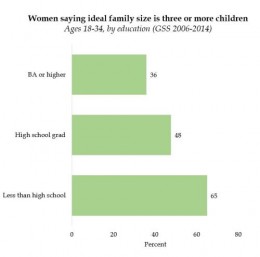In 21st century, postmodern, computerized America, do you see the number of 1-ch
In 21st century, postmodern, computerized America, do you see the number of 1-child families
increasing among highly educated & affluent couples? Conversely, do you see less educated & poorer couples still opting for larger families(4-more children)?
I guess it will be up to the couple. However, in Australia, right now the government is encouraging old people, in their 50s onward, to become entrepreneurs. This is because there aren't enough young people in the work force, and if the older ones don't start a small business, then the government will be burdened by rising pension and health costs, which can bring the economy down. The good thing is, boomers are discovering their hidden business skills and likely they are pleased with that. But they invest their retirement money, their assets to start an SME because banks don't like to make loans to old people's businesses. So the boomers are pretty remarkable in spite of that. My parents had the six of us when they were not well off, but later on we had a good life because my father was very successful.
I'm not trying to confuse you with information, Grace, but anyway if it's useless you can throw it out. But in India they have a population nearly equal to that of China. However, the majority of families want sons, so if the ultrasound shows it's a girl they have an abortion. And there are so many rapes in India. I'm rambling, I know. Maybe you can like you know, in one ear out the other. But your questions do make me think. Maybe too much...
The number of 1-child families in 21st century, postmodern, computerized America will definitely increase among highly educated & affluent couples. Such couples oftentimes marry & have children in their 30s after attaining the highest possible education & becoming established socioeconomically. Also, because of increased social networks, the notion of having siblings is slowly becoming an outmoded idea. Especially among the educated & affluent, siblings are totally unnecessary & even a hindrance regarding their child's development. Educated & affluent couples realize that their only children can thrive because their children will be exposed to other children through participation in myriad intellectual & cultural activities. They furthermore are cognizant of the fact that children don't need siblings in order to develop properly. Educated & affluent parents are aware that parents are the primary teachers & interactors regarding a child's development, not siblings who are just children themselves.
Conversely, less educated & poorer parents will continue to have larger families of 4-more children. They believe that children need siblings to grow & interact with. These parents furthermore feel that parents play less part in a child's development than siblings do. These are the parents who leave children to raise themselves & each other. They feel that it is a waste of time teaching & interacting w/their children, figuring that is what siblings are for. They feel that children learn & gain more from sibling interaction than from interacting w/them as parents. They feel that it is best for children to raise themselves.There is a correlation today between intelligence and fertility rate. There's an argument to be made that too intelligent and you find reasons not to have children, which is why those with masters and doctorate degrees have the highest rate of childlessness despite having on average the best financial situation to have children.
Excellent answer, highly intelligent & educated women tend to have 0-1 child while the stupidest, less intelligent & least educated women breed mindlessly & have THE MOST children that they can ill afford.
There is also that feeling of accomplishment. Educated people have fulfilled one accomplishment where those of a lesser education may only have the choice of children to fulfill their need for some form of accomplishment. My opinion, Greg.
Gregas, you are so spot on in your analysis. People have large/very large families because they have nothing else going on in their lives, particularly women. Women who have very limited or no options are the ones having large/very large families because they have no outside interests, careers, hobbies, & other activities. They have a void in their lives which is fulfilled by having children. Such women use children as a panacea for their empty lives. These women also don't have the educational wherewithal to do something significant & worthwhile w/their lives. Women who have large/very large families are typically have very little to no educated, subpar intelligence, & have narcissistic tendencies. They are also passive, letting things happen rather than taking charge of their lives.
Highly intelligent & educated women have more options in their lives. They oftentimes have careers, friends, hobbies, activities, & other interests. They feel that there is more to life than to continuously have children. They see a world outside of having children & are fulfilled through their careers, friends, hobbies, & other outlets. Highly intelligent & educated women either have small families or are childfree as there are myriad options for them to live a fulfilling life.
Unforttunately, stupid, unintelligent, & the least educated broodmares have children as a means of accomplishment as they have NOTHING ELSE in their subpar lives so they breed like ad continuum & ad infinitum.....
Related Discussions
- 10
The Role of Parent-Child Interaction
by Grace Marguerite Williams 13 years ago
Parents are often more instrumental in a child's development than a sibling is/siblings are. Children who interact with their parents on a constant basis often have more advanced vocabularies and other adult mannerisms than children who only interact with each other in the family. ...
- 19
Negative Outcomes Regarding Children From Large Families
by Grace Marguerite Williams 5 years ago
According to an article from Business Insider, a study done by researchers Juhn & C. Andrew Zupann of Houston University along with Yona Rubinstein of the London School of Economics, children born into large families have lower likelihoods to succeed because with each additional child in the...
- 10
How important is religion in the development of a child?
by JP Carlos 13 years ago
How important is religion in the development of a child?
- 20
What do you consider as an "ideal" number of children to raise?
by Jeremy Gill 10 years ago
What do you consider as an "ideal" number of children to raise?
- 26
Who's smarter the first born or the second born (or the third or forth)?
by Jami Johnson 10 years ago
Who's smarter the first born or the second born (or the third or forth)?I always hear, the first born child is smarter because they have more attention from the parents.... or the second born is smarter because of the older brother/sister, etc... So what do you believe? Are the first born children...
- 13
If your were the oldest child in your family were you given huge responsibilitie
by Penny Godfirnon 7 years ago
If your were the oldest child in your family were you given huge responsibilities?Were you given responsibilites beyond your years and were you able to accomplish them or did you suffer from failing your parents!









